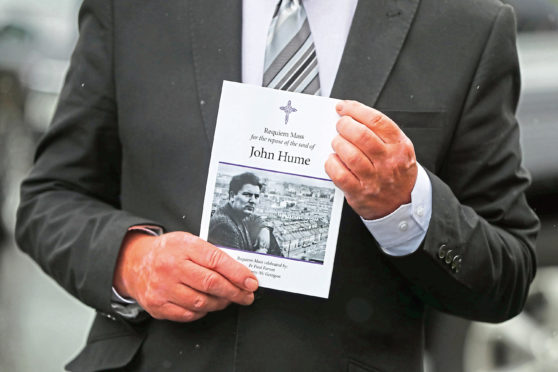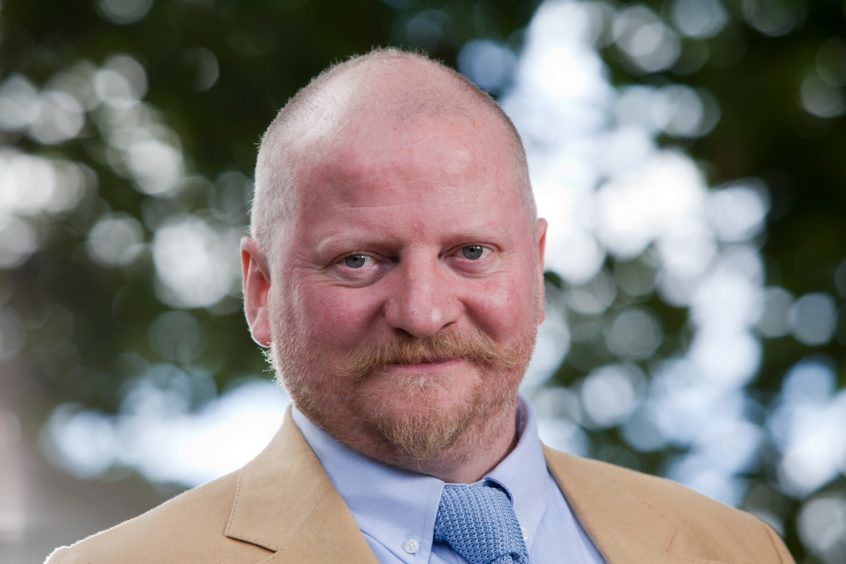As John Hume is mourned, Scotland is still looking for its great political figure.
Lacking the civil rights outrage of Northern Ireland in the 1960s, or a war on the streets, Scots are set on a path of difference without any great motivational factor.
Perhaps this is why it has yet to produce a figure as serious as Hume.
Thanks to Hume and others, the six counties have moved beyond violence.
The new struggle is to get hostile camps to agree on things like use of the Irish language.
It would look trivial if you didn’t know the recent history of the province.
The troublesome territory of the UK is now Scotland. A cause looking for a great injustice, Scottish independence supporters cite the democratic deficit: it gets governments it doesn’t want and decisions it rejects, such as Brexit.
The weakness to this argument is that it got a lot more accountability through devolution and has done much with it and rejected independence in a free vote in 2014.
Would Hume have been an Indy voter or a Scottish Unionist? His passion for social justice might have outweighed the risks of independence.
It’s a theoretical argument and I don’t mean to drag his memory into our local affairs, but it’s a matter the new Tory leader in Scotland might want to ponder.
Douglas Ross has been installed as successor to Jackson Carlaw. This change has been dressed up as a sequence of honourable people doing their duty, when it’s really a coup by Downing Street in panic at the thought they’ll lose Scotland.
The fear is driven by polls showing majority support for Indy and a landslide for the SNP at next May’s election.
Ross is to be mentored by Lord Davidson, as Ruth has become, though the ex-head of the Scottish party isn’t to tip the ermine until after the coming Holyrood vote.
A dream team? Only for the snoozy. Ross has made no impression thus far in his career and Davidson is so well known as a Boris basher she is more an embodiment of the problem, not the solution.
Without a great motive, the case for and against the Union is often circumstantial. “Free by 93” because of that nasty Mrs Thatcher.
The Iraq war is wrong, so Scotland is right. Cameron is a toff so, er, down with them.
It’s not until Boris and Brexit that you come to harder reasons. Quitting the EU is a material change in Scotland’s being, against her wish.
Couple that to the clown Boris, who evidently didn’t understand the EU question and who has yet to offer a plausible answer and you have real antagonism.
The PM flew to Orkney last week, a fiercely pro-EU place, to wave a crab at the cameras, while insulting the entire country by saying Scotland couldn’t have coped with the virus if it weren’t for the Union. It was insanely bad politics.
His slogan is detached from sense and context. Saying Scots can’t cope is just offensive and quite possibly racist.
One imagines Johnson was linking the ideas of UK Government aid to the uncertainty over Scotland’s post-independence economy to the assumption that Scots can only be poorer outwith the Union and balling all this into a grenade of stupidity.
The SNP feeds off a diet of attacking London, but the Tories would be fools to play the same game.
Attacking Edinburgh sounds like an attack on Scots in general. Unionists need to be the bigger men, shrugging off the insults and talking up the positives.
The Union case has become a political battle, a matter of personnel, a campaign to be won.
This is flimsy. If the Union is to survive, it has to matter. There needs to be a substance and value to it far deeper than slogans.
Further, it has to matter as much in Downing Street as it does in Orkney, every day of the year.
The first weakness is Brexit. If it’s vital to “bring back control” from a generous Brussels, then why does the same not to apply to Edinburgh in relation to London?
The Union needs a profound case for being.
That cannot be based on the idea that London pays for everything and the rest of the UK should be grateful. Set aside the factual flaws in that argument and you still have a patronising, patrician view of government.
The second great problem is Boris himself. He represents the overconfident public school boy winging it.
And on Brexit, playing at tough guy with some very dubious friends in the English nationalist camp.
If he walks like a nationalist and quacks like one then who can blame Scots for ducking when they see him coming.
Ross and Davidson might look to Hume, as might Scot Nat leaders.
He upset nationalists – his politics weren’t hardline – and Unionists – he was a nationalist in disguise.
He did so again by brokering a peace deal. Both sides had to compromise.
But he never lost his sense of what ultimately mattered – that his countrymen deserved better.
The Ireland he wanted has yet to emerge, but you’d never say he failed. Is the same true of our leaders?











